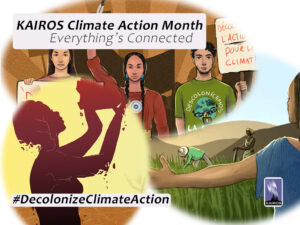Everything’s connected

We are approaching the end of KAIROS Climate Action Month. This week we will review the nexus between the climate emergency and colonization, gender, conflict/peace, and migrant justice to name a few interconnected issues. We will also look to how we respond.
Climate Justice has been a longstanding KAIROS focus. Decolonizing climate change takes it to the next level. That “Next level” is the topic of the final online event, Taking it to the next level: Decolonizing Climate Action on Tuesday, September 27 at 7:00 p.m. EST. Register here.
Imara Rolston will lead this panel discussion. He is the Director of the Community Climate Resilience Lab. His work integrates racial justice and the climate crisis in the context of community resilience – the ability of a community to respond effectively and recover quickly to difficulties. Joining Imara are:
- gkisedtanamoogk, who is Wampanoag from the Native Community of Mashpee and a long-time member of the KAIROS Indigenous Rights Circle
- Anupama Ranawana-Collie, a postcolonial feminist theologian and international development researcher with roots in both Canada and Sri Lanka.
How worried are you about climate emergency? Are you hopeful, optimistic or despairing? Where do you find hope? On Tuesday, September 27 our blog will focus on just that: Climate Anxiety and Hope.
On Wednesday, September 28, we will examine how the dots connect – that is, how every topic addressed during Climate Action Month connects to the theme of “Decolonizing Climate Action.”
September 30 (Friday) is the National Day For Truth and Reconciliation. On that day, also known as Orange Shirt Day, Connor Sarazin, KAIROS Blanket Exercise Communications & Partnerships Coordinator, will share his reflection on Indigenous knowledge and climate solutions. We will also share a reflection by Jose Zarate, Canadian Indigenous Communities & Latin America-Caribbean Development Program Coordinator for the Primate’s World Relief and Development (PWRDF) of the Anglican Church of Canada, and PWRDF’s representative on the KAIROS Indigenous Rights Circle. Please also visit Resources for September 30 and the Events Calendar of our website for September 30.
The National Day for Truth and Reconciliation is a federal holiday but is not recognized in every province.
Listening to the voices that have been muted due to colonisation is imperative and the theme of this year’s Season of Creation. We encourage you to take time during that day to learn about the Truth and Reconciliation calls to action or participate in a related event.
Colonialism marked Indigenous peoples for elimination and genocide. And yet Indigenous communities persist in the face of centuries of catastrophe and despite systemic exclusion. Non-Indigenous peoples can learn from them.
For example, Indigenous peoples have a different perspective on the extractive economy, a system that is strangling creation. Leanne Betasamosake Simpson (Michi Saagiig Nishnaabeg) described the incompatibility of capitalism with this Indigenous worldview in a conversation with Naomi Klein:
“Colonialism and capitalism are based on extracting and assimilating. My land is seen as a resource. My relatives in the plant and animal worlds are seen as resources…. The act of extraction removes all of the relationships that give whatever is being extracted meaning. Extracting is taking… That’s always been a part of colonialism and conquest.”
COP27 delegate Alison Cox talks about an Indigenous mindset or worldview that advocates for Mother Earth, rather than ourselves:
“When we are able to advocate for ourselves… we are advocating for Mother Earth. We are advocating for those things that cannot speak for themselves, that have no voice. That’s who we are thinking about. If we can start channeling that mind set for those things that we don’t see as living but are interconnected to us and to our world as much as our blood and our bones and everything that we need to live.”
This way of living in the world would lead to more effective climate action.
As we wind down Climate Action Month we have to find ways to ramp up the level of conversation and action on the climate emergency. Climate Action Month promoted letter-writing to government leaders (English or French) on important ecological justice bills now before Parliament. Please write a letter and encourage at least 5 people to do the same. Another action you can do is to host a Faithful Climate Conversation among people at your house of worship. Advocate for a fossil-fuel non-proliferation treaty to municipal leaders. Pray. Change your lifestyle to live more simply and carefully on the Earth. You might find it better for your well-being, and a more just and sustainable way of living.
Finally, continue to follow the KAIROS and For Love of Creation COP27 delegation. Listen to the voices of global and Indigenous partners at upcoming events before, during and after COP27 and amplify and act on them.
Questions for Consideration
- In your view, what moral issues does climate change present to your own faith community?
- How do we respond in our personal and communal lives?
- What does your faith community need to do to bring a moral and justice lens to creation-care and climate change issues?
Week 4 Digest
Week 4 – COP27 Solidarity- Indigenous Partners
Introducing Clifford Mushquash, Anishinaabe from Pawgwasheen
UN Day of Peace –Climate Crisis is a peace issue
Introducing Yusra Shafi, youth delegate








